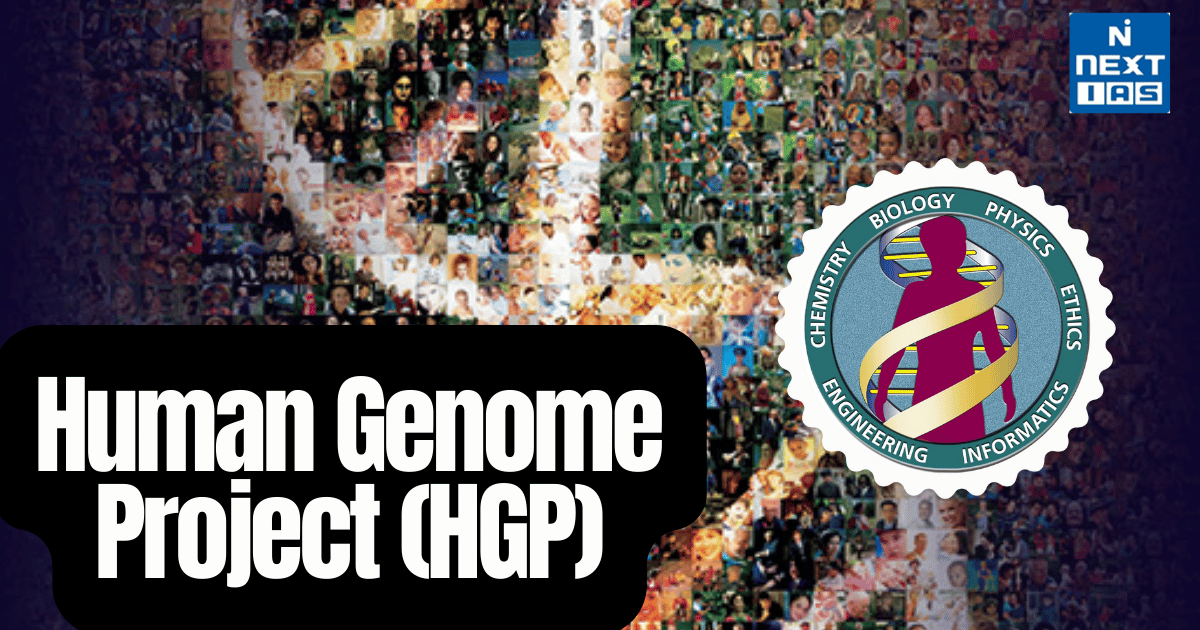
The Genome India Project (GIP) is a scientific initiative launched in 2020 to sequence the genomes of diverse Indian populations and understand genetic variations and disease-causing mutations. Its significance lies in its potential to advance personalized medicine and improve healthcare outcomes tailored to the unique genetic makeup of the Indian population. This article aims to study in detail the objectives, significance, challenges, and potential impact of the Genome India Project on health and science in India.
About Genome India Project (GIP)
- The genome project is a scientific endeavor that takes inspiration from the Human Genome Project (HGP).
- The HGP was an international project that aimed to map and understand all of the genes of the Human species.
- The project was active from 1990 to 2003. Gaining knowledge from the HGP project, the new project was initiated in 2020 with the goal to study the genome of the Indian population.
- The Indian population is known to be one of the most genetically diverse populations in the world.
- Through the study of the Indian population genome, researchers want to gain useful insights that will help effective treatment of the Indian population’s health.
- The project is a joint effort of 20 different institutions from all over India and the Centre for Brain Research, located in the Indian Institute of Science in Bangalore, has the helm of the project.
Need of Genome India Project
- India’s 1.3 billion people belong to more than 4,600 groups of people, many of which practice endogamy (marriage within small circles or populations).
- These groups have distinctive genetic variations and disease-causing mutations that are unlike those found in any other groups of people.
- Interbreeding in India has led to the creation of distinctive genetic variants. Mapping them and creating personalised drugs and therapies using that data can be undertaken.
- The US, China, and the UK have programmes to sequence at least 100,000 genomes each.
Significance of Genome India Project (GIP)
- Precision Healthcare:
- The goal is to create interventions in advance through personalised therapeutic measures for patients’ genomes in order to anticipate and manage diseases.
- The mapping of propensities for a certain set of diseases to their variations to genes enables precise and anticipatory interventions to diseases that have not developed yet.
- As an illustration, variations in the genomes may clarify why cardiovascular disease in South Asians results in heart attacks, while in most parts of Africa it instead results in strokes.
- Sustainable Agriculture:
- The same kind of advances can be made in agriculture with a deeper understanding of the genetic reasons for a plant’s vulnerability to pests, insects, and other productivity-impeding factors.
- This would lead to less use of chemicals.
- International Cooperation:
- One of the projects covering the world’s most diverse gene pools would definitely contribute to global sciences as well.
- Because of its scale and the kind of diversity it would bring to genetic studies, the project is considered alongside the most crucial of its kind in the world.
Challenges of Genome India Project (GIP)
- Scientific Racism:
- Concerns about scientific racism and the chronicling of stereotypes relating to heredity and racial purity are now being overlooked. In the past, similar “scientific” studies were thought to ‘justify’ slavery and other discriminatory practices through ideologies such as the white man’s burden.
- In a country like India which is already plagued by identity based politics, genetic mapping may serve to worsen these inequalities.
- Data Privacy:
- Heavily related to privacy, such research prompts questions around data privacy and its storage. The absence of a formal data privacy legislation in India, diminishes the hope of not misusing GIP’s genetic data.
- Ethical Issues:
- The questions it raises are the possible for medics to do gene editing or selective breeding in secrecy.
- The 2020 case of a Chinese scientist who created gene-edited babies shows how serious such practices have always been—they resulted in his sentencing. Such cases should always be taken into account before permitting such projects.
| What is a Genome? – The discovery of the DNA structure by Watson and Crick in 1953 marked the beginning of the study of genetics, which seeks to understand how genes influence traits and diseases. – DNA, or Deoxyribonucleic acid, is a molecule that carries the genetic instructions for the development, functioning, growth, and reproduction of all living organisms – The genome of an organism is the complete set of its genetic material, including all of its genes. It contains all the information required to build and maintain the organism. |
| – In humans, the genome comprises more than 3 billion DNA base pairs arranged in a double helix structure. – The study of genomics, which involves the analysis of genomes, has revolutionised many fields, including biotechnology, medicine, and agriculture, by providing new insights into the mechanisms of disease, drug development, and improving crops and livestock. What is Genome Sequencing? – Genome sequencing is figuring out the order of DNA nucleotides, or bases, in a genome—the order of adenine (A), thymine (T), cytosine (C), and guanine (G), that make up an organism’s DNA. |
Read our detailed article on Genome.
Conclusion
In conclusion, the Genome India Project represents a critical step toward understanding the genetic underpinnings of health and disease in one of the world’s most genetically diverse nations. By mapping the genomes of various population groups, the project holds the potential to enhance personalized medicine, improve agricultural resilience, and contribute to global genetic research. However, it is essential to navigate the ethical and privacy challenges that accompany such groundbreaking scientific endeavors. As the GIP progresses, its success could set a precedent for future genomic research and applications in India and beyond, ultimately leading to improved health outcomes and a deeper understanding of human genetics.
FAQs: Genome India Project
Who launched the genome India project?
The Genome India Project was launched by the Department of Biotechnology (DBT), Government of India. Led by the Indian Institute of Science (IISc), Bengaluru, in collaboration with a consortium of research institutions, it aims to map India’s genetic diversity for advancements in healthcare, precision medicine, and disease prevention.
What are the aims of genome India project?
The Genome India Project aims to map genetic diversity across India’s population, enabling advancements in personalized medicine, disease prevention, and genetic research. It seeks to identify population-specific health risks, improve drug responses, and contribute to global genomic studies, fostering precision healthcare and biotechnological innovation in India.
What is the indigen genome project?
The IndiGen Genome Project, launched by the Council of Scientific and Industrial Research (CSIR), India, aims to sequence and analyze Indian genomes to understand genetic diversity. It helps in developing personalized medicine, identifying disease risks, and improving healthcare by creating a comprehensive genetic database for India’s population.
Which is the nodal agency for genome India project?
The Indian Institute of Science (IISc), Bengaluru, is the nodal agency for the Genome India Project, launched by the Department of Biotechnology (DBT), Government of India. IISc leads a consortium of 20+ research institutions to map India’s genetic diversity, advancing precision medicine and healthcare innovation.
What is the Genome India project, why it matters?
The Genome India Project is a national initiative to map India’s genetic diversity by sequencing 10,000 Indian genomes. It matters because it enables precision medicine, disease risk assessment, and genetic research, helping develop targeted therapies, improve healthcare, and contribute to global genomic studies, fostering medical and biotechnological advancements in India.





